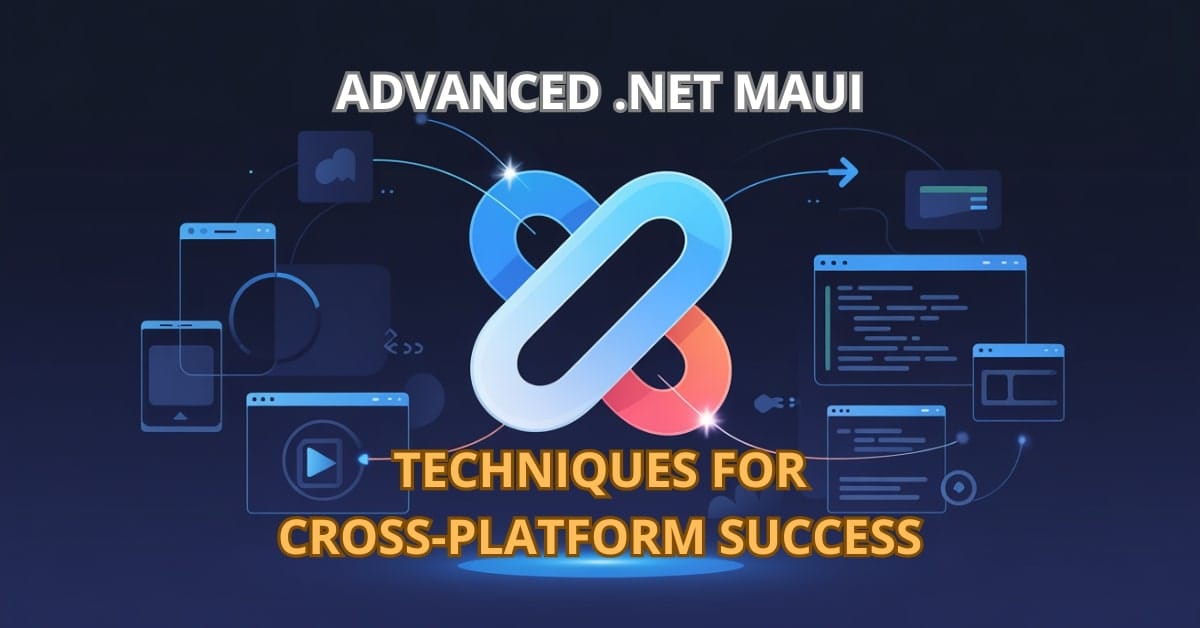Are you sure you’re using .NET MAUI to its fullest potential? Most developers only scratch the surface! In this deep dive, I will guide you through advanced .NET MAUI techniques that can seriously upgrade your cross-platform game. Expect reusable libraries, dazzling animations, rock-solid testing, and even web integrations with Blazor. Buckle up, and let’s turn your good app into a great one!
Creating Cross-Platform Libraries in .NET MAUI
Writing Reusable Components
Reusable code is gold. In my projects, I always aim to build components that I can easily plug into other apps. This reduces duplication and speeds up development massively.
Here’s an example of a reusable button component:
public class PrimaryButton : Button
{
public PrimaryButton()
{
TextColor = Colors.White;
BackgroundColor = Colors.Blue;
CornerRadius = 8;
Padding = new Thickness(12);
FontSize = 16;
}
}Explanation: We’ve just created a PrimaryButton that you can reuse across all your views. Instead of styling buttons repeatedly, you centralize the design. Update here, and it’s reflected everywhere!
Publishing NuGet Packages
You can take it a step further by publishing your library as a NuGet package.
Steps:
- Create a Class Library project.
- Add your reusable components.
- Install
NuGet CLIand run:
nuget pack MyLibrary.csproj
nuget push MyLibrary.nupkg -Source https://api.nuget.org/v3/index.jsonNow, you (and your team) can add it to any project via NuGet Package Manager. Clean and efficient!
Animations and Transitions
Implementing Smooth Animations
Smooth animations are the heartbeat of delightful apps. Without them, even the best features feel clunky.
Let’s animate a label fade-in:
private async void FadeInLabel(Label label)
{
label.Opacity = 0;
await label.FadeTo(1, 500, Easing.CubicIn);
}Explanation: The FadeTo method creates a smooth fade-in effect over 500 milliseconds. Adding this to onboarding screens or interactive elements increases perceived performance.
Using Lottie and SkiaSharp
Bring life to your apps with Lottie animations!
- Install
Lottie.Formspackage. - Add your JSON animation to the project.
- Use it like this:
<lottie:LottieAnimationView
Animation="loading.json"
AutoPlay="True"
Loop="True"
HeightRequest="200"
WidthRequest="200" />Explanation: Lottie animations are vector-based and scalable without losing quality. Perfect for splash screens or engaging loaders.
Pro Tip: If you need custom drawing, integrate SkiaSharp:
canvas.DrawCircle(100, 100, 80, paint);Simple but powerful for custom charts or graphics!
Testing .NET MAUI Apps
Unit Testing and UI Testing
No app is truly production-ready without tests.
Unit Testing with NUnit:
[Test]
public void CalculateTotal_ReturnsCorrectSum()
{
var result = Calculator.CalculateTotal(2, 3);
Assert.AreEqual(5, result);
}Explanation: This unit test ensures that the CalculateTotal method returns expected results. Quick and effective!
UI Testing with Appium:
- Install Appium.
- Define a simple test:
[Test]
public void TestLoginScreen()
{
var usernameField = driver.FindElementById("usernameEntry");
usernameField.SendKeys("testuser");
var loginButton = driver.FindElementById("loginButton");
loginButton.Click();
}Explanation: With Appium, you automate user flows to catch regressions early.
Tools to Boost Your Testing
- NUnit for unit tests
- Appium for UI automation
- Xunit for advanced scenarios
- SpecFlow for BDD (Behaviour Driven Development)
Trust me, investing in tests today saves headaches tomorrow.
Integrating .NET MAUI with Blazor
Using Blazor in .NET MAUI
One of the most exciting features in .NET MAUI is the ability to run Blazor inside your app!
builder.UseMauiApp<App>().UseMauiBlazorWebView();Explanation: This command lets you embed Blazor components in your MAUI app. Yes, that means web and mobile share the same UI logic!
Implementing Razor Components in Mobile Apps
You can use your existing Razor components inside your MAUI app seamlessly:
<BlazorWebView HostPage="wwwroot/index.html">
<BlazorWebView.RootComponents>
<RootComponent Selector="#app" ComponentType="typeof(MainComponent)" />
</BlazorWebView.RootComponents>
</BlazorWebView>Explanation: Here, MainComponent is your Razor component. This setup gives you massive code reuse across web and mobile platforms.
Real-world tip: Use this to build internal tools that run on both web and mobile with minimal additional effort!
FAQ: Clearing Up Common Questions
Absolutely! Use a private NuGet feed or Azure Artifacts.
Yes! Since they are vector-based, they scale beautifully with minimal performance hit.
Use Visual Studio’s hot reload and in-browser dev tools for Blazor WebView.
100%! It pays off by automating tedious manual tests and catching critical issues before release.
Conclusion: Bring Your .NET MAUI Apps to Life
As you can see, mastering these advanced .NET MAUI techniques transforms your development workflow. From reusable libraries to smooth animations, rigorous testing, and Blazor integration, you’re now equipped to build professional-grade, cross-platform apps.
I challenge you: try one of these techniques in your next project and share your experience in the comments! For more tips and deep dives, follow this blog and let’s keep growing together.
